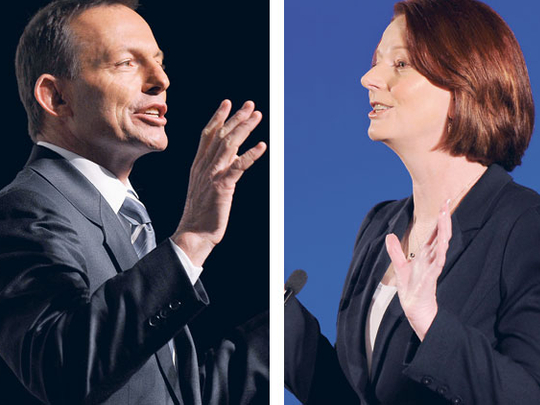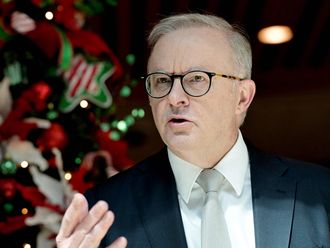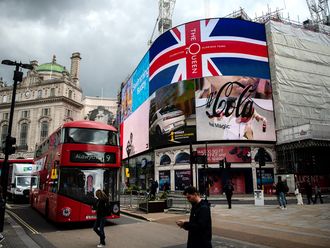
Sydney: Voting has ended in Australia's tightest national election in decades, which could see conservative Tony Abbott end Prime Minister Julia Gillard's short tenure in a stunning upset.
The country's first woman leader, who seized power eight weeks ago by ousting predecessor Kevin Rudd in a Labour Party coup, was neck-and-neck in opinion polls with Abbott, who has run a trouble-free campaign.
"This is a big day for our country," Liberal/National coalition leader Abbott said as he cast his vote, after a beachside barbecue in Sydney. "It's a day when we can vote out a bad government."
Around 14 million electors took part in a mandatory vote across the nation; with experts saying the outcome was too close to call.
"This is a tough, tight, close contest, but I'm exercising my own vote," Gillard had said earlier as she cast her ballot in Melbourne.
As polls closed at 6pm on Saturday in the eastern states of Queensland and New South Wales, where the election is likely to be won or lost in a swathe of marginal seats, early exit polls gave the government a slim victory.
Two separate television exit polls, conducted before polling closed, predicted Gillard's party would win by 51 or 52 per cent of the vote to the coalition's 48 or 49, but indicated dangerous swings against Labour in key marginal seats.
Former Labour Prime Minister Bob Hawke urged caution over the early polls, saying the tightest election since 1961 could go either way or even end in deadlock.
"It is a fact that we could have a narrow Labour victory, a narrow coalition victory or a hung parliament," he told Sky News.
Gillard's centre-left Labour Party ran a campaign riddled with problems and struggled to quell voter anger over June's shock ousting of elected Prime Minister Rudd, lifting Abbott's hopes of a surprise victory.
"When everyone asked I said it would be a cliff-hanger and so it's proving today," said Gillard, a 48-year-old red-headed former lawyer who was born in Wales. She has pledged better education and healthcare and played up Labour's role in helping Australia shrug off the financial crisis, as well as a planned national broadband scheme.
Abbott, a 52-year-old religious conservative, who has doubts about mankind's role in climate change, has targeted fears over illegal immigration and questioned Labour's spending record, as well as its knifing of Rudd.
The right-leaning coalition needs a uniform swing of 2.3 per cent to return to power, less than three years after Rudd ousted Prime Minister John Howard, who served for over 11 years, pledging action on climate change and impoverished Aborigines.
Victory for Abbott would make Labour the first one-term government since 1932, when the party's James Scullin lost power during turmoil caused by the Great Depression.
Such a defeat would be an ironic end to a government that won international praise for its handling of the global financial crisis, from which Australia emerged stronger than any other Western economy.
Both sides are targeting marginal seats in resource-rich Queensland, which is Rudd's home state, and western Sydney, where rapid population growth has put pressure on services and raised concerns about immigration.
The media are torn in their support of both Gillard and Abbott, but commentators agree Labour should not have replaced Rudd just ahead of polls and underestimated the opposition leader, who has tempered his image as a colourful maverick. However, Labour's tenure could be saved by Australia's complex proportional representation electoral system that allows voters to pick their party and also list their second and subsequent choices in order of preference.
If voters who are disillusioned with Labour trump for the Greens, as many analysts expect, but preference Labour, those votes may be redistributed to the ruling party under a deal between the parties, possibly nudging it over the line.












